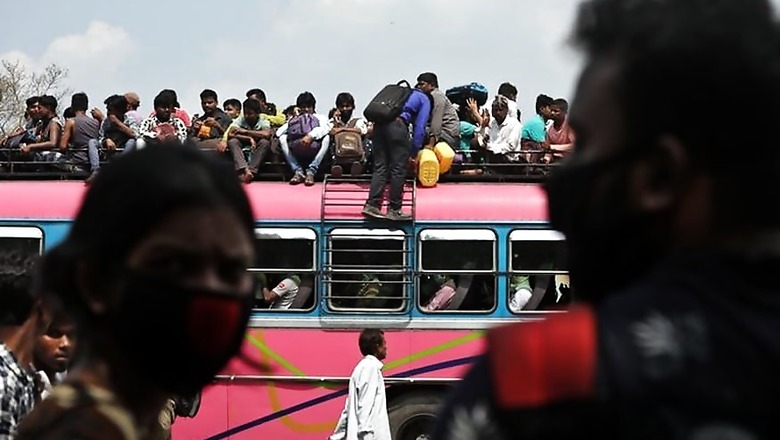
views
New Delhi: With now over 1.4 million confirmed cases, the Covid-19 pandemic has rapidly spread across the globe. However, unlike the developed countries, India has laid measures of a complete lockdown to flatten the curve and control the novel coronavirus from spreading.
All kinds of passenger movements are restricted except for the crucial ones related to medical and health services and the supply of essential goods. While it is extremely difficult to say when and how the lockdown will be fully or partially lifted, it is certain that the precautionary measures to check the pandemic may last for months.
Restricting the mobility of the people for a long time is an uphill task for any government. Amidst the lockdown, India witnessed an upsurge of migrant workers and labourers, who wanted to leave their place of work and return to their home towns to unite with their loved ones in these difficult times.
Clamouring for travel facilities, many of them decided to travel on foot to reach their native places undaunted by the fact they would have to traverse long distances. Within cities, many workers engaged in the supply of essential services face difficulties in travelling to work in the absence of regular public transport.
As the battle against Covid-19 is anticipated to be a long one, public transport services may have to resume, at least, in a limited manner. To begin with, curtailed and limited services plying between restricted origin and destination points may have to be resumed by domestic airways, railways, intercity and intracity public buses and metro railways.
Millions of passengers are desperately waiting for Indian Railways to operationalise passenger trains. However, the resumption of these services may attract large crowds into railway stations, which could potentially accelerate the contagion. Therefore, there is a need for regulating passenger travel by giving preference to health and medical professionals, medical patients going for treatment, defence and government functionaries, migrant workers, and students and persons with special needs. People wanting to return home or be with their loved ones should be also permitted on humanitarian grounds.
But before the resumption of services in the above-mentioned domains, adequate precautionary measures would have to be taken to minimise the spread of the pandemic. Some of the measures such as thoroughly disinfecting all the buses and railway coaches, withdrawal of blankets from air-conditioned rail coaches, etc. have already been introduced.
The Indian Railway Act empowers the railways to refuse passengers suffering from infectious and contagious diseases without the proper authorisation to travel. The Act further provides for the segregation of such persons from other fellow passengers and makes arrangements of travel for him/her in a separate carriage. Extant rules allow the railways to take adequate steps in consultation with civil authorities to prevent the spread of an epidemic.
Not long ago, the railways used to insist on cholera vaccination certificates before issuing tickets to the pilgrims and other travellers to large religious gatherings such as the Kumbh Mela and similar public events. The same restrictions were placed on those taking buses and opting for personal means of travel.
The Railway Board should issue similar notification for checking the highly infectious Covid-19 and formulate rules and procedures to check the carriage of patients who have tested positive of the coronavirus. The railways should issue orders like compulsory prescribed medical checks such as measuring body temperature, etc, both at the originating stations and destinations.
Furthermore, the government should notify Covid-19 as a dangerous epidemic disease under the Epidemic Diseases Act 1897. Passenger transport operators should provide facilities such as alcohol-based sanitisers in buses and metro coaches for travellers to use. The number of passengers on a bus or a train coach should be restricted so that they are able to maintain a suitable distance from their fellow passengers. Travellers should be encouraged to use face masks and bus conductors could be provided with devices that indicate body temperature to screen the passengers.
Primary screenings for identifying infectious diseases have many limitations of their own. For example, during the H1N1 influenza outbreak in 2009, many international travellers, who were asymptomatic carriers of the virus, could not be identified in the screenings.
These screening systems may also give a false sense of security as observed in the case of exit screening for Ebola in Liberia, 2014. However, primary screenings certainly reduce the chances of the spread of the disease. Many state governments are already planning screening measures at rail-road entry points into the state. Delhi Metro, too, is taking steps to provide sanitisers and to introduce thermal check of commuters before entry. Similar measures should be taken to screen passengers at inter-state bus terminals.
Indian Railways may collaborate with state governments for primary and secondary screenings by health professionals and further healthcare of potentially Covid-19 exposed passengers. As community spread of the disease increases, primary screening by railways could potentially become crucial for linking the coronavirus infected cases to public healthcare systems. The screening would dissuade those who are ill from travelling. Establishing such a system has the potential of preserving public confidence, relieving political and social pressures and limiting the negative consequences of travel by both road and rail.
Once the lockdown is relaxed in mid-April, an exodus of migrant workers could be expected, especially travelling through Indian Railways and inter-state bus systems. In such a scenario, it is upon the state governments to establish screening systems at entry and exit points. They must coordinate with the railways for establishing primary screening systems and linking the same with state public health systems for secondary screening.
Transport operators should start gearing up to accomplishing what may seem like a Herculean task of arranging basic screening facilities for the safety of passengers in close coordination with the state governments. They should prepare themselves well to make such arrangements as required before the lockdown is lifted either partially or fully.
(Shri Prakash is Distinguished Fellow, TERI, and Aravind Harikumar is Research Associate, Centre for Sustainable Mobility, TERI. Views expressed are personal)




















Comments
0 comment